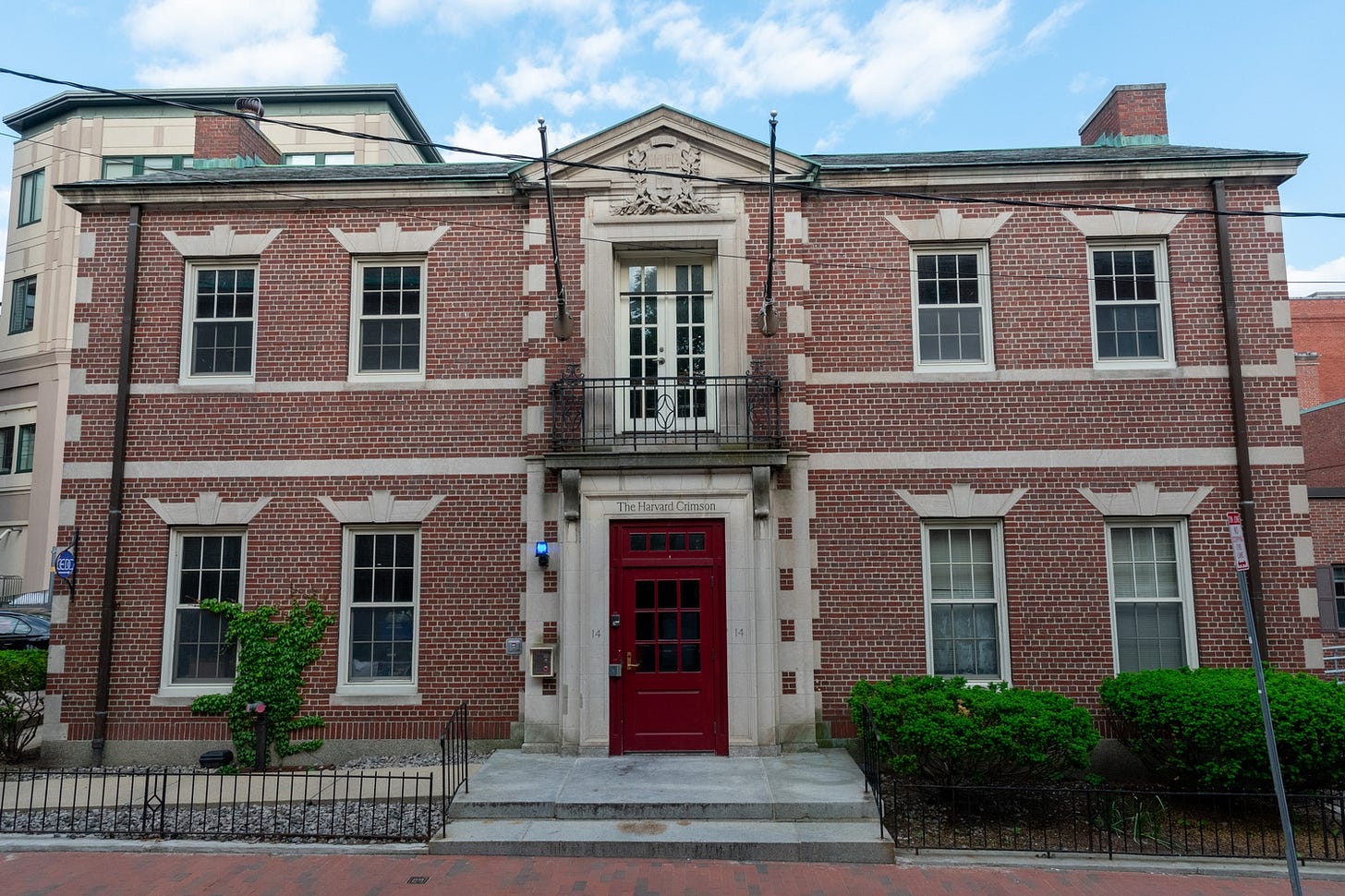The Crimson’s Campaign Against Dissent

Over the past couple of weeks, The Harvard Crimson has turned its pages into a case study in institutional prejudice. What began as a profile on Harvard Law Professor Adrian Vermeule ’90 and his theory of Common-Good Constitutionalism has metastasized into a campaign of suspicion, one aimed squarely at professors and students who dare to think or speak from the political and moral right.
The opening salvo, an October 4th feature, claimed to introduce Vermeule’s legal philosophy. It did no such thing. The piece began as exposition and ended as character assassination, pairing his Catholicism and classical leanings with Carl Schmitt and sprinkling the usual buzzwords: authoritarian, frightening, Orwellian. The reader was invited not to consider ideas, but to smell danger.
That impression might have been tempered had the Crimson included the comments of Vermeule’s longtime colleague, Professor Jack Goldsmith. He told the reporters that Vermeule’s book “recovers a tradition of constitutionalism that was prevalent at the founding” and that it “has influenced a lot of people, including a lot of people who have a real-world impact in law and elsewhere.” His statement never saw print. The omission, perhaps defensible as editorial economy, nonetheless reinforced the story’s chosen narrative. The omission feels, to anyone close to Vermeule or his position, less like editing and more like erasure.
When questioned about the selective quoting in the Vermeule piece, Crimson president McKenna E. McKrell ’26 replied: “It is standard practice to speak with a wide range of relevant sources during the reporting process. Our published stories do not necessarily quote from every interview conducted or statement received.”
True, however, the point is not that some quotes were omitted. Rather, it is that the one quote capable of complicating the narrative was.
When asked about the story, Vermeule said he had long since stopped reading the paper. “That decision was confirmed,” he wrote, “when I looked at their article on the Charlie Kirk memorial ceremony… which omitted any mention of my encomium for Kirk, possibly because my theme was that Kirk walked in the light of Christ. The Crimson seems to me yet another institution consumed by a very particular political agenda.”
Days later, the paper redirected its zeal from faculty to students. The next major piece fixated on a line in The Harvard Salient’s print edition that happened to resemble a phrase from a 1939 speech by Adolf Hitler. That resemblance became the headline. Our clarification—that neither the author nor the editors had recognized the resemblance and that the phrase long predates the Third Reich—was mentioned but immediately minimized. The insinuation stuck.
The pattern of subsequent pieces was unmistakable. One article lamented how “onerous” it was to launch a formal investigation into The Harvard Salient. Another, from the editorial board, struck a tone of procedural calm while quietly conceding that such an investigation might be justified. A third op-ed dispensed with the pretense altogether, branding The Harvard Salient as little more than a hate group that should be monitored and, if need be, silenced. Report, editorialize, and moralize, with each step moving the boundary of the permissible a little further left, until ordinary conservative thought is one headline away from criminality.
Asked about reports—first shared with The Harvard Salient—that staff members had made extreme remarks about our writers, McKrell responded: “We unequivocally deny that Crimson writers called for the public execution of the writer of ‘The Abolition of Peoples’ during editorial proceedings. Based on a review of detailed records of the opinions shared during recent editorial meetings, we believe this claim to be categorically false.”
She added that editorial meetings follow “strict discussion norms” and that the board “has consistently condemned political violence.” Those lines do sound reassuring; they are also beside the point. The question is not whether explicit threats were uttered, but whether the paper’s culture has made hostility toward dissenters feel routine.
Together, the coverage forms a coherent script. The conservative scholar becomes the reactionary theorist. The traditionalist student becomes the bigot. The publication that prints their ideas becomes the threat. “Fascism” is no longer a historical reference but a weaponized cliché, a way to place opponents outside the moral guardrails of the University. To be labeled “authoritarian,” “integralist,” or Nazi-adjacent is to be rendered abominable. That, increasingly, seems to be their point.
This is not a plea for sympathy. It is a record of the narrowing of Harvard’s intellectual life—of a campus that proclaims free expression while quietly cultivating fear of it. The Crimson once trained some of the finest journalists in the country. It can still reclaim that legacy, but only if it remembers that fairness is not a courtesy—it is the job. To tell the full story, even when it offends one’s tribe, is not generosity; it is professionalism.
For our part, The Harvard Salient will go on printing what we believe to be true. We will meet argument with argument. The campaign to box out conservative voices from Harvard’s public square will fail for one simple reason—truth endures longer than outrage, and we intend to endure with it. And if the Crimson finds itself unable to run a supposedly neutral paper without campaigning against its peers, it might consider sticking to its remaining specialty. On that front, at least, Professor Vermeule assures us, “their Harvard sports coverage is passable.”



Sadly, the Crimson are only imitating their mentors at the NYT, who never let truth or journalistic ethics get in the way of a chance to slander, demonize, or falsely criticize conservatives.
An articulate and well-reasoned piece. Congratulations for throwing a penalty flag on the Crimson's latest intellectual infraction.